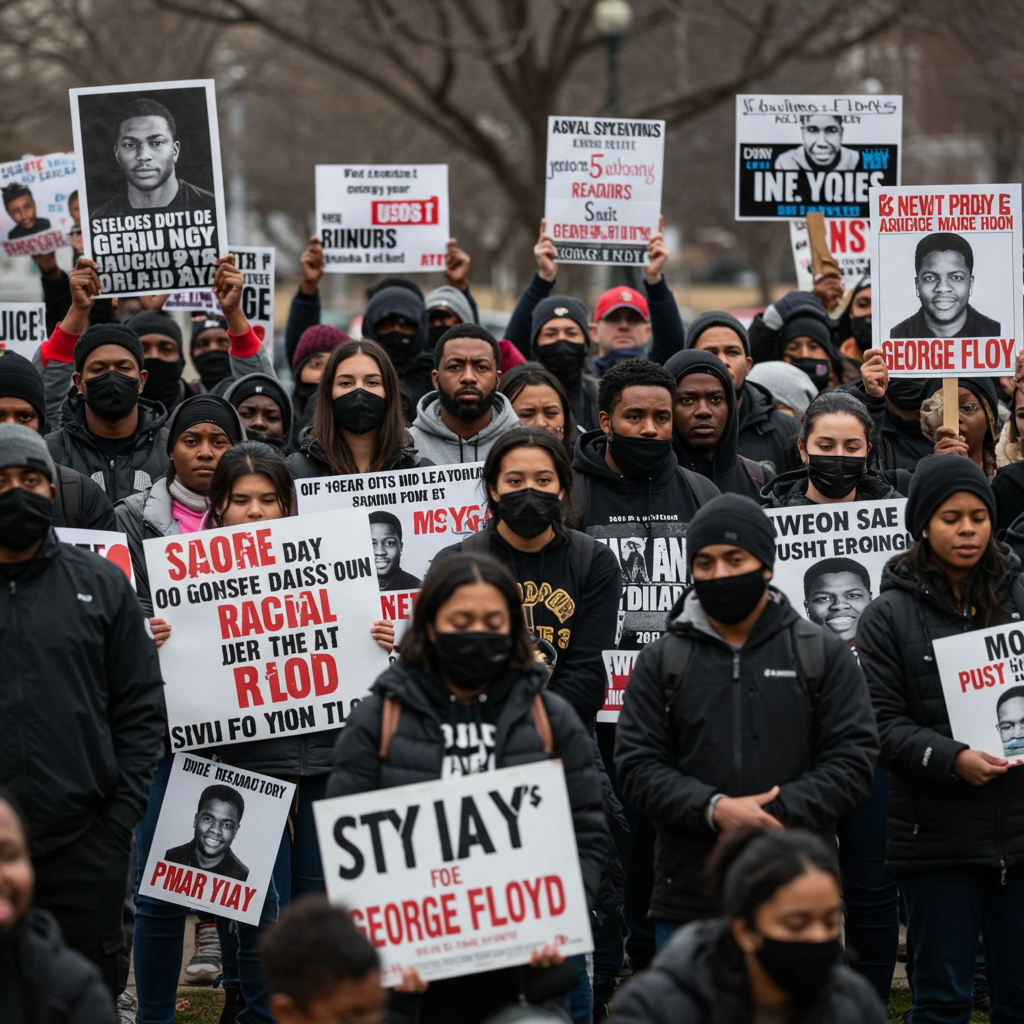Five years after the death of George Floyd at the hands of police in Minneapolis, Americans across the country paused to remember the moment that ignited a national and global movement for racial justice and police accountability. Commemorative events were held in both Houston, Texas, where Floyd grew up and is buried, and Minneapolis, Minnesota, the city where he died.
Floyd’s killing in May 2020, captured on a bystander’s phone camera, sparked outrage and led to widespread protests under the banner of Black Lives Matter. What many observers at the time described as a national “reckoning” with systemic racism galvanized millions to take to the streets, demanding an end to police brutality and racial inequality.
Remembering George Floyd: Events in Houston and Minneapolis
On the fifth anniversary, remembrance gatherings underscored the enduring impact of Floyd’s life and death.
In Houston, Floyd’s family came together near his gravesite for a service led by civil rights leader Rev. Al Sharpton. Other local events included poetry sessions, musical performances, and speeches by community pastors, reflecting the deep roots Floyd had in his hometown.
Meanwhile, Minneapolis marked the anniversary with several commemorations. These included a morning church service, a candlelight vigil, and an evening gospel concert. These events were part of the annual Rise and Remember Festival held at George Floyd Square, the intersection where Floyd was murdered and which has since been named in his honor. Angela Harrelson, Floyd’s aunt and co-chair of the Rise and Remember nonprofit, urged attendees to “rise up and continue the good work we started” five years ago. Rev. Al Sharpton echoed this sentiment, stating that while the conviction of former officer Derek Chauvin was a “rare step toward justice,” the “work is far from over.”
From Reckoning to Resistance: The Trajectory of Reform
In the immediate aftermath of Floyd’s death, there was a push for systemic change. Under the previous administration, the U.S. Justice Department initiated civil investigations into several local law enforcement agencies suspected of systemic misconduct, including those in Minneapolis and Louisville. These investigations resulted in comprehensive agreements, known as consent decrees, aimed at implementing federal oversight for enhanced training, accountability, and data collection within police departments.
However, five years on, the path forward appears increasingly uncertain, marked by political challenges and a perceived fading of the initial momentum. The current administration has recently criticized the basis for these police reform agreements, describing the methodologies used as “flawed” and arguing that the agreements “handcuff” local police. Despite this, Minneapolis Mayor Jacob Frey has stated the city’s commitment to complying fully with its consent decree.
Beyond police reform, Diversity, Equity & Inclusion (DEI) initiatives that gained traction following the 2020 protests have also faced pushback. Critics argue these programs can be discriminatory, and some federal and state-level actions have targeted their implementation.
Symbolic changes also reflect a shift in the public landscape since 2020. In Washington, D.C., the Black Lives Matter Plaza street display near the White House was removed, and a prominent mural of George Floyd in Houston was recently destroyed during a building demolition. Some commentators argue these actions, alongside discussions among some political allies about potentially pardoning Derek Chauvin, signal a deliberate effort to roll back progress and erase the memory of the movement spurred by Floyd’s death.
Public Perception and the Uncertain Legacy
Recent public sentiment suggests a disconnect between the initial hopes for widespread change and the reality five years later. A May survey found that a significant majority of participants (72%) believed there had been no meaningful improvements in the lives of Black people in the U.S. over the past five years. The same survey also indicated a notable decline in public support for the Black Lives Matter movement since June 2020.
This perceived lack of sustained progress leads some to view the initial “racial awakening” as perhaps short-lived or largely performative, lacking the commitment necessary for fundamental systemic change. Addressing deep-seated issues requires dismantling and rebuilding foundational systems, a task that America has historically struggled to sustain. The concept of “Black fatigue” – the exhaustion resulting from the ongoing fight against systemic racism – is contrasted with a perceived “white fatigue” regarding discussions about racial injustice.
Despite these challenges and the uncertain nature of George Floyd’s legacy five years later, his family and many supporters remain determined. They view the ongoing struggle not as a setback but an impetus to continue pushing for reforms and justice, viewing remembrance itself as an act of resistance against any attempts to diminish the significance of his death and the movement it inspired. The anniversary serves as a poignant reminder of the initial calls for a transformed society and the ongoing, complex fight to achieve lasting racial equity and accountability.
References
- https://www.bbc.com/news/articles/cgmjzyp0kwzo
- https://www.bbc.co.uk/news/articles/cgmjzyp0kwzo
- https://timesofindia.indiatimes.com/world/us/george-floyds-uncertain-legacy-is-marked-five-years-on/articleshow/121388766.cms
- https://time.com/7281847/time-unveils-special-report-five-years-later-america-looks-for-a-way-forward-after-george-floyd/
- https://contrarian.substack.com/p/it-took-america-only-five-years-to




